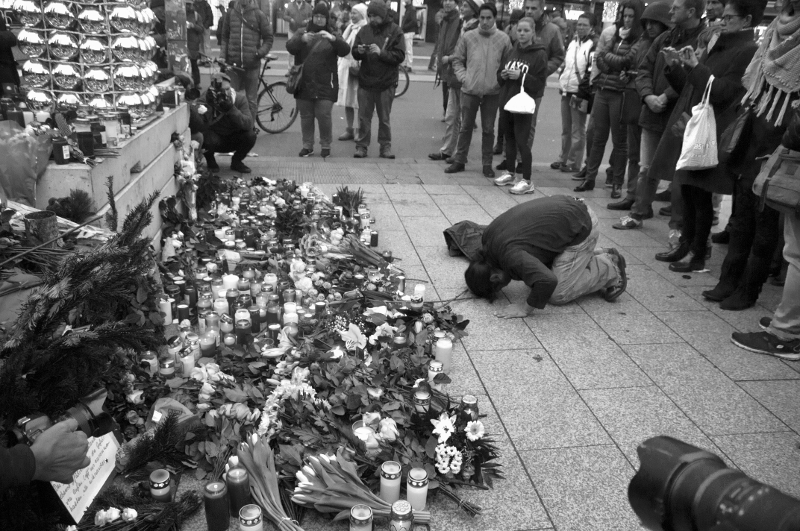It is now almost a year ago that Anis Amri, a Tunisian man who had arrived in Germany in 2015 and claimed to be a refugee, steered a lorry into a Berlin Christmas market, killing 12 and injuring 56.
New report on intelligence failings
Almost immediately after the event, growing evidence pointed to severe failings on the part of the authorities. Not only had they not noticed the danger emanating from Amri; different sections of the justice system had also failed to arrest the young man following any of his multiple brushes with the law.
Amri, whose legal right to remain in the country had expired long ago, had had repeated run-ins with the police not only on the grounds of suspected Islamist radicalism but also for violations of residence requirements and for a range of drug infractions.
Now, a new report, commissioned by the government of Berlin, has attempted to chronicle the events leading up to the December 2016 attack. Its author, former federal prosecutor Bruno Jost, paints a dismal picture of German counter-terrorism efforts.1
Lack of cooperation and of personnel in the counter-terrorism sector
Jost describes how large gaps opened up in Germany’s counter-terrorism architecture that allowed Amri to slip through the cracks for more than a year. The vertical information flow between different levels of the security apparatus remained deficient, so that high-level counter-terrorism bodies – who discussed Amri and his potential plans – never held all the relevant information that had been collected.
Horizontally, cooperation between the different institutions – various police departments, domestic intelligence agencies, and prosecutorial bodies – was equally haphazard. Moreover, security agencies did not share information across Germany’s internal federal boundaries, meaning that the states of Berlin, North-Rhine Westphalia, and Baden-Württemberg left each other in the dark regarding their respective insights into Amri’s persona and intentions.
Finally, Jost highlighted severe staff shortages particularly in Berlin: although the capital’s authorities had for a time designated Amri as the most dangerous individual with jihadist linkages in the city, they were unable to keep track of him. Notably, he could only be monitored on weekdays: on weekends, there was a lack of staff.
Solving the staffing problems
As a response to the Amri case, politicians from across the political spectrum have called for greater centralisation of counter-terrorism efforts at the national level. Similarly, there is cross-partisan agreement on the need to replenish Germany’s police, whose forces had been depleted over the course of several years of budget cuts.2
More personnel, however, will most likely not solve all problems but may also generate new issues of its own. In fact, the reliability of German counter-terrorism staff has come repeatedly into question in recent months.
Questions about the reliability of intelligence personnel
First, the country’s domestic intelligence agency – the Verfassungsschutz – was rocked by revelations about an alleged Islamist mole. In this somewhat bizarre case, a former porn actor and bank clerk, who had recently joined the agency, had passed on classified information online to a supposed member of the Salafi scene – who, in fact, turned out to be another member of the Verfassungsschutz working undercover.
While it was initially suspected that the man had acted out of jihadist motivations, he ultimately turned out to be not driven by political or religious terrorism but by “boredom”: in different internet fora, the man had enjoyed playing different ‘roles’, passing himself off in turns as a hard-core militarist, a far-right neo-Nazi, and a fervent jihadist.3
A state informer as an Islamist agent provocateur
In the case of Anis Amri, intelligence personnel has played an occasionally dubious role, too. Prior to his attack on the Christmas market, Amri moved in the orbit of hard-line preacher ‘Abu Walaa’, arrested in November 2016 for being the central node of ISIS’s network in Germany. Recent investigations have shed light on the potentially pivotal role of an inside man employed by the Verfassungsschutz within these circles.4
The undercover informer, working under the codename “Murat”, had driven Amri to Berlin on at least one occasion in 2016. Moreover, there is evidence that Murat pushed Amri to commit an attack in Germany: a Muslim man who had witnessed interactions between Murat and Amri turned to the police after the Christmas market attack, alleging that Murat had been a crucial influencer inciting Amri to violence against German targets.
Murat had reported to his superiors at the agency that Amri was considered a candidate for travelling to Syria in order to join local jihadist groups – rather than being prepared to mount an operation in Germany. Now the possibility emerges that Murat himself may have overplayed his role as an agent provocateur, thereby helping to pave the way for the Berlin attack.
Blurring lines between state intelligence bodies and terror groups
The case of “Murat” thus highlights the possibility that the inside agents of the Verfassungsschutz – called V-Männer in German intelligence jargon – may become important factors in the terrorist groups they are supposed to observe.
The resulting blurring of the lines between intelligence agency and terror group is not confined to the Islamist spectrum: Investigations into the National Socialist Underground (NSU) cell, who killed 10 (mostly immigrant) victims between 2000 and 2006 and was responsible for two bomb attacks as well as 14 bank robberies, have uncovered systematic linkages between the neo-Nazi terror group and the German intelligence community.5
Shadow of the NSU case
Seven intelligence agencies paid more than 40 men and women inside the NSU’s network. Among them were high-level neo-Nazi functionaries; and many informers had a long criminal history ranging from incitement of racial hatred to attempted murder.
A high-level agent the Verfassungsschutz is suspected of having been at the scene of at least one of the NSU’s murders; and the agency’s informers have been accused of having sheltered NSU members and of having delivered weapons and explosives. After the NSU was discovered, the agency shredded a large number of documents pertaining to the NSU affair, protecting its informers and preventing the full investigation of the group to this day.
The Verfassungsschutz’s heavy reliance on inside men also caused the failure of an attempt to ban the neo-Nazi NPD Party in 2003: the fact that high-level NPD leaders were in fact paid informers of the domestic intelligence agency led the Constitutional Court to decide that the party could not be banned because it was too close to the state and hence not independent in its decisions.6
Demands for more electronic surveillance
It is perhaps against this backdrop that agencies have recently renewed their demands for enhanced legal and technological tools that can help dispense with reliance on controversial V-Männer. The President of the Verfassungsschutz, Hans-Georg Maaßen, reiterated his call that his agency be given access to online messaging services such as WhatsApp and Telegram. He also demanded enhanced competencies for surveillance of internet browsing.7
One might be tempted to observe that none of these new tools would have been necessary to apprehend Anis Amri: existing legal possibilities would have been sufficient, had the various players in the police and intelligence communities only managed to work together and use them.
When asked about the failure to stop Amri, however, Maaßen continues to reject all responsibility. Instead, he places the blame at the feet of Angela Merkel’s (brief) open-door policy of summer 2015. Maaßen asserts that Amri crossed the border irregularly, that he had no legal claim to asylum, and that he should have been deported back to Italy under the rules of the Dublin system even before his agency should have become involved.8
Sources
http://www.spiegel.de/politik/deutschland/fall-anis-amri-sonderermittler-wirft-behoerden-versagen-vor-a-1172571.html ↩
http://www.deutschlandfunk.de/nach-bericht-zu-anis-amri-das-ist-wirklich-eine-bittere.694.de.html?dram:article_id=398118, http://www.zeit.de/politik/deutschland/2017-10/terrorismus-union-forderung-reform-ueberwachung-anis-amri ↩
http://www.mdr.de/nachrichten/vermischtes/urteil-maulwurf-verfassungsschutz-100.html ↩
http://www.sueddeutsche.de/politik/anschlag-in-berlin-die-mysterioese-rolle-eines-v-manns-im-fall-amri-1.3689391 ↩
http://www.focus.de/politik/deutschland/v-mann-affaere-fatale-frenz-connection_aid_204938.html ↩
http://www.handelsblatt.com/politik/deutschland/verfassungsschutzchef-maassen-fordert-mehr-technische-werkzeuge/20416986.html ↩
http://www.fr.de/politik/geheimdienst-verfassungsschutz-fordert-mehr-befugnisse-a-1363344,0#artpager-1363344-0 ↩






